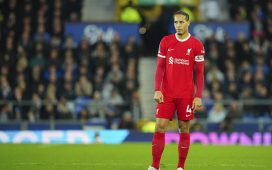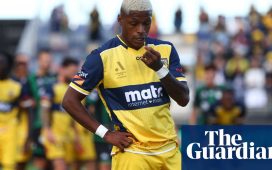There is probably only one thing a manager can do at Paris Saint-Germain that would enhance his reputation, which is to win the Champions League – and even then there would be plenty of people looking at the £900m net spend since the Qatari takeover in 2011 and thinking: “About time.” Mauricio Pochettino has not done that.
If, as seems likely despite his insistence this week he is staying, he leaves PSG in the summer, he does so with the blot of a rare second-placed league finish on his record. He will at least have answered the criticism that he had never won silverware – collecting last season’s Coupe de France and this season’s Ligue 1 title – but that jibe was always largely meaningless; leading Tottenham to third, second and third in successive seasons, and to the second-highest points tally in their top-flight history (adjusting for two/three points for a win and size of the division), is a greater achievement.
But there is a sense now that Pochettino’s status has diminished over his two years in France. Even offering all the usual caveats about social media polls, it is remarkable that when Gary Neville asked his Twitter following last month whether they would prefer Manchester United to appoint Pochettino or Erik ten Hag, 82% went for the manager with no Premier League experience.
Of course the failure to win the league last season must count against Pochettino. PSG’s budget is roughly double that of its nearest rivals; it is a sad fact of the economics of modern French football that if PSG do not win the league it is a failure. That Pochettino was there for only half the season isn’t really an excuse.
The problem was that PSG took just four points from the six games against Lille, Monaco and Lyon, the three other sides who made up the top four. They were found wanting in matches against the toughest opposition, which for a club that places such a priority on the Champions League is a major problem.
But that has always been the paradox of PSG: the stronger it grows the less it is challenged, and the less it is challenged the less equipped it is to win the battles against sides near its own level. Domination breeds decadence, which is why the history of PSG in the Champions League is of hilarious collapses.
The arrival of Lionel Messi only exacerbated the tendency. A front three of Messi, Neymar and Kylian Mbappé may be one of the most exciting ever assembled, but there is a cost, which is that their extravagance must be balanced by a hard-grafting and deep-lying midfield, militating against the sort of integrated football that defines the best, rather than merely the wealthiest, sides in the world. None of this is Pochettino football and it is his fault only in that he took the job.

Perhaps earning a reported £5.6m a year after tax, living in Paris and picking up a couple of cheap trophies is attractive, but PSG as a club is almost unmanageable. The stars and their egos dominate. Imposing the sort of modern, cohesive pressing that characterised Pochettino’s sides at Tottenham, Southampton and Espanyol is largely futile.
So, yes, Pochettino’s time at PSG has been underwhelming and, yes, two years of a manager’s career can’t just be written off as irrelevant, but to succeed at PSG is almost impossible – his sacked predecessor, Thomas Tuchel, who also bears responsibility for the league failure, ended the season after moving to Chelsea by winning the Champions League.
Results had fallen off in the final months at Tottenham, progress to the Champions League final masking a dismal end to the 2018-19 season, and they were 14th in the Premier League when he was sacked in November 2019, but the problems with the squad had long been signposted by Pochettino.
The move to the new stadium restricted budgets and limited investment, but just as big an issue was the failure to move on players Pochettino felt had begun to go stale – and his intense style of management means that he perhaps exhausts certain players more quickly than most.
Burned by appointing José Mourinho when he was long past his peak, Manchester United apparently worried that Pochettino’s best days might be behind him. And it is true that the past three years have not been particularly impressive. But he is two years younger than Ten Hag, even if he has been managing three years longer, and has a broader experience.
There are perfectly good reasons to appoint Ten Hag, provided he is given the right structure. But if United’s decision really was unduly influenced, as has been suggested, by concerns that Pochettino is in decline or by that poll, it only emphasises concerns about the lack of football understanding at the top of the club.
This is not like the Mourinho situation. Pochettino’s slight recent downturn is unlikely to be a result of him having lost energy or motivation, of him struggling to connect with younger players or of football having moved beyond his interpretation of it.
So what next if Pochettino does leave PSG in the summer? United seemed ideal for him given he appears to have the force of personality as well as the coaching nous that will be necessary. It may be he only has to wait a year and that opportunity will come round again.
But another possibility could occur sooner, given Antonio Conte is the clear favourite to replace him at PSG – indeed, beyond Zinedine Zidane, who is apparently hoping for the France job after the World Cup, Conte is the only real alternative candidate at present. And that is a return to Tottenham.
The Fiver: sign up and get our daily football email.
Conventional wisdom says you should never go back, although David Moyes says otherwise. And Pochettino would return, oddly, with power enhanced, given the concessions and assurances Daniel Levy would presumably have to offer to persuade him to return – and if he loses Conte, credibility would demand a major figure. Pochettino would also have his reputation strengthened given his warnings four years ago were clearly correct. This is a bit of unfinished business that might just be satisfactorily concluded.







